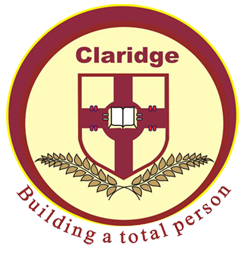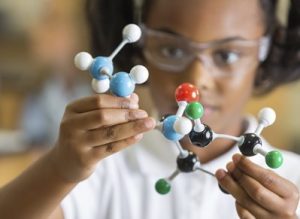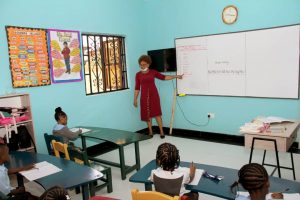Please choose the extra activity you wish to register your child. Note that once you choose, there will be no refunds or transfer to other activities during the term.
Early Learning Goals
During these early years, our curriculum covers six broad areas of learning. These learning goals focus on what children need to learn and set out what children are expected to achieve by the end of the foundation stage.
Personal, Emotional & Emotional Development (Social Studies)
Children will learn to be confident, take an interest in things, know what their own needs are, tell the difference between right and wrong, and be able to dress and undress. During the years in the nursery classes, the organizing theme in social studies is family and community celebration. Nursery pupils learn social studies by:
- Comparing and contrasting the past with the present
- Demonstrating understanding of how geography affects the way people live
- Comparing and contrasting people of the same and different cultures
- Demonstrating understanding of bargaining, bartering and money
- Participating in the democratic approach to decision making
- Understanding how current events affect our daily lives
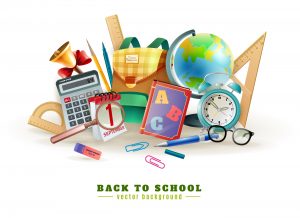
Communication, Language & Literacy (Reading & Language)
Children will learn to talk confidently and clearly, enjoy stories, songs and poems, hearing and saying sounds, and linking them to the alphabet. They will read and write some familiar words and learn to use a pencil. From the first day, children are immersed in an environment rich in language. Daily, they are read to from books. Extensive classroom libraries include copies of the best children books. Teachers work with individuals and small groups, helping children develop the skills and understanding required to read and write, initially putting down only letters they know and gradually moving to whole words and sentences.
Pupils in nursery classes demonstrate their emerging literacy by:
- Comprehending and responding to spoken language
- Using drawing and writing to represent their thinking
- Showing an awareness of the rules of spelling, punctuation, capitalization and grammar
- Using a variety of strategies to recognize words
- Gathering and analyzing information from a variety of sources
- Using language to pose and answer questions and problems
- Sharing learning
- Participating in discussion as speakers and listeners
- Responding and making connections to the work of others
- Developing an appreciation for the rhythm pattern and variety in language
- Choosing reading, writing and discussion as important daily activities
- Responding to a variety of written materials
Knowledge & Understanding of the World (Science & Health)
Children will explore and find out about the world around them, asking questions about it. They will build with different materials, know about everyday technology and learn what it is used for. They will find out about past and present events in their lives and families’ lives. They will find out about different cultures and beliefs. The nursery science program encourages children to build understanding in four broad areas – Living Things; Our Environment; Seasons; and Matter and Energy.
With the same focus on active involvement, program in health include Safety at Home and on the Playground; Dental Health; Preventing Disease; Recognizing Feelings; and Similarities and Differences. Equipments, books, and other materials for children to conduct experiments and investigate these topics are brought into the classrooms. In science and health, pupil are:
- Demonstrating curiosity and participating in activities
- Acquiring information through reasoning and observation
- Processing information through discussion, writing, and drawing
- Developing concepts and vocabulary pertinent to science and health themes
- Demonstrating understanding of relationships among science, society and the environment
- Using a variety of scientific tools and methods
- Exhibiting responsible attitudes toward personal health and safety
Mathematical Development ( Mathematics)
Children will develop an understanding of mathematics through counting, stories, songs, games and imaginative play. They will become comfortable with numbers and with such ideas as “heavier than” or “bigger”.
They will be aware of shapes and space. In the nursery classes, pupils spend about one half of the time in mathematics developing number concepts, Manipulatives, calculators, activity sheets and other resources help children learn mathematics and its application to their daily lives.
Pupils gain mathematical understanding by:
- Using estimation and mental math as strategies
- Recognizing shapes
- Demonstrating an understanding of patterns
- Demonstrating an understanding of numbers through counting
- Using computation skills
- Collecting, graphing and interpreting data
- Using knowledge of math for problem solving
- Using language to explain an understanding of mathematical concepts
- Using measurement concepts and tools
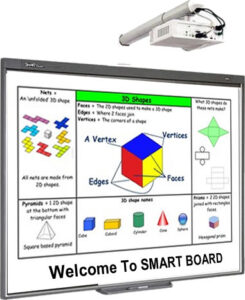
Children will learn to move confidently, controlling their bodies and handling equipment. Nursery pupils participate daily in vigorous physical activities.
Games, fitness stations, obstacle courses, rhythm, movement and tag activities promote physical fitness. Pupils are introduced to sports terminologies, rules, safety guidelines and use of equipment. In physical education, nursery pupils are:
- Demonstrating motor skills needed to participate in physical educational activities
- Participating appropriately and productivity in a variety of physical educational learning activities alone and with others
- Exhibiting an understanding of rules of games and other activities
Creative Development (Arts & Music)
Children will explore colours and shapes, trying out dance, making things, telling stories and making music. In nursery art classes, pupils use a variety of media and the work of artists from many cultures to learn art concepts. They produce art with materials such as markers, paint, paper, glue, and clay.
Pupils are:
- Developing motor skills to facilitate expression of ideas
- Showing ability to unite content, design, materials and process to create art work
- Demonstrate ability to perceive and respond to different aspects of art work
- Showing good judgement in the selection and use of tools and media for art work
- Participating appropriately and productively in a variety of art learning activities
In music classes, nursery pupils interact with music in three ways. Pupils perform music when they play simple melodies. They describe the melody, rhythm and tempo of music, and they create melodies of their own. During music lessons, pupils are:
- Demonstrating a good sense of rhythm
- Joining in group singing
- Participating appropriately and productively in a variety of music learning activities
The Nursery Curriculum
Claridge School curriculum begins with a focus on the children who come to us, but it extends into the future as well, envisioning the adults these children will become. Beginning in our nursery classes, we develop learners capable of finding and solving problems, collaborating with others, and accessing, organizing, and presenting complex information. Every day we support students in mastering the basics and moving into the sophisticated reasoning and communication skills which will prepare them to create and care for the world of the future.
In Claridge School classrooms, children are immersed in environments that reflect five essential characteristics:
- Challenging – They learn by being engaged in complete and complex tasks.
- Balanced & Flexible – They learn in their own individual ways.
- Collaborative – They learn by working together.
- Experiential – They learn by doing.
- Reflective – They learn by revisiting their work.
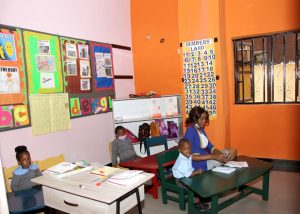
First impressions of school last, so our nursery classes offer the warm, happy and constructive introduction to set the children off to a flying start.
The educational focus is on structured play, but includes first steps in reading, writing and early numbers. The nursery education plays a vital role in preparing pupils for higher and more advanced schooling. As such, we ensure that our students enjoy a varied and stimulating balance between learning through play and more formal study for reading and early mathematics. Mastering the alphabet, letter sounds and coming to grips with writing are combined with the introduction of more structured teaching for mathematics, science, social studies, art, music and physical education.
These early years (ages 2+, 3+, 4+) make up our foundation stage. Work at this stage probably won’t feel like learning as most children see it as just fun and play. But as they get to grips with speaking and listening, singing and dancing, stories and counting, they will be gaining those essential basic skills that will get them off to a flying start when they begin primary one.
The nursery is the place where pupils begin the development of life skills. They learn about themselves as individuals within a group of peers.
The classroom as a social learning community provides opportunities for:
- – Working cooperatively with others
- – Focusing attention on self-selected tasks
- – Focusing attention on teacher-selected tasks
- – Monitoring their own behaviour in the group
- – Demonstrating responsibility for personal belonging
- – Showing eagerness to learn new things.
- – Working on creative, self-initiated tasks
- – Attempting to resolve conflicts with appropriate strategies
- – Respecting rights and properties of others
- – Seeking and accepting adult help when needed
The Primary Curriculum
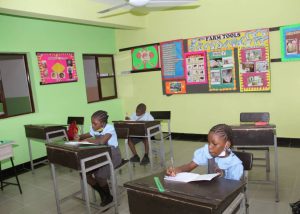
During the primary years, all the children build strong skills in reading, writing, mathematics, and take essential steps in science, social studies, computers, French art, music and physical education. The children gradually become assured readers, understanding what they are reading and eager to read more. Above all, we aim to instill in every child a love of reading books for life. Right from the start, we emphasize correct grammar, spelling and punctuation. We help the children balance creativity with accuracy. Poetry and drama are used extensively to help language development. In early mathematics, a practical approach creates an understanding of the basic concepts on which all future study is based. Computers are introduced from the first year of primary school to ensure all children are computer literate.
English
Through carefully planned involvement in reading, writing, listening and speaking activities, pupils develop a high level of proficiency and lifelong love of the beauty and power of language.
Shared Reading
Pupils read together and share what they have read in order to learn from each other and to analyse their thought based on the responses of others.
Independent Reading
Pupils read on their own for growth and for pleasure from a wide array of materials.
Assigned Writing
Pupils develop specific writing skills when they work on writing assignments given by the teacher.
Writers Workshop
Pupils develop their own writing style by selecting and writing on topics of interest.
Discussions
Pupils converse about their reading and writing, learning to listen intently and to build on the ideas of others.
Inquiry Experiences
Pupils learn to ask questions, find information, explore alternatives and draw conclusions.
Demonstration of Learning & Celebrations
Pupils demonstrate growth and celebrate success by publishing their writing and sharing their work with an audience.
Mathematics
The mathematics curriculum is based on the belief that children need to be actively involved with concrete experiences in order to move to abstract levels of mathematical understanding. Children develop mathematical concepts by using manipulative materials, calculators and computers. Central to the curriculum is problem solving, and whenever possible, pupils solve real-world problems that are interesting and meaningful to them.
Numbers
Pupils explore number patterns, develop computation skills and use the number system to solve problems.
Measurement
Pupils measure with real measuring tools. They estimate and use measurement to describe and compare objects.
Pattern
Pupils discover, describe, duplicate, extend, and create patterns using manipulative, numbers, shapes, and written symbols.
Geometry
Pupils learn basic terminologies for geometric figures. They apply concepts such as angle, line and diameter to their work with these figures.
Data Analysis
Real data is gathered, graphed and studied for trends.
Logic
Pupils are encouraged to write and talk about discoveries they have made and strategies they have invented. The reasoning and login involved in this process is valued. Mental arithmetic is emphasized, and pupils learn when it is appropriate to estimate.
Science & Health
The science curriculum promotes an understanding of the core concepts and principles of science, an awareness of the impact of science and technology on every aspect of life, and an ability to use scientific ways of thinking for individual and social purposes.
The comprehension health curriculum is an organized, sequential program, which promotes health as a life value. This curriculum equips pupils with the information, skills and attitudes for a lifestyle of personal health, and to become discriminating consumers of information and products. We want pupils to see themselves as person empowered for a lifetime of wellness and productivity. Science literacy is therefore for all our pupils. A learning cycle approach is used in both science and health.
Exploration comes first, providing opportunities for pupils to experience materials, phenomena and information first hand. The next stage is concept introduction, where pupils discover the meaning of the concepts and are introduced to new terms.
Finally, pupils demonstrate understanding and expand the idea in the stage of concept application through the use of problem-solving situations.
Mobile labs, transportable tubs filled with hands-on materials, support an active approach to learning in health and science. The science curriculum consist of four instructional focus areas.
Life Science
Pupils explore the concepts of energy and change in all living organisms. They learn about the relationship between living and non-living things, and what plans and animals need to live
Environmental Science
Pupils study how plants, animals and other organisms adapt to their environment and how they affect their ecosystem.
Earth Science
Pupils learn about this earth and it relationship to space through studying aspects of the earth, its weather, its climate, and its place in the solar system.
Physical Science
In their study of physical science, pupils work with the states of matter, forms of energy, magnets and machines.
Social Studies
The social studies curriculum prepares our pupils to become productive and responsible citizens.
Pupils develop a strong sense of identity with the past, as well as with the family and community, and the intellectual and social skills to understand themselves and others. They learn about making informed decisions and about participation as citizens of their country.
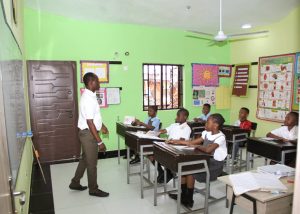 History
History
Pupils study the relationship between the past and the present, concepts of time and chronology of historical events.
Geography
Pupils locate places and describe their physical, human and cultural characteristics. They explore the influence of geographical factors on historical and contemporary issues.
Economics
Pupils identify and apply basic economic concepts such as exchange, money, price, markets, interdependence, and investment and savings, and demonstrate their use in their everyday choices. They discover how economics is related to technology, ethics, and public policy issues.
Civics
Pupils study the reciprocal relationship between an individual and a group, an individual and an institution, and a individual and a political system. They learn about the role of the law, how governing bodies make decisions and the functioning of a democratic society.
Culture
Pupils are exposed to the traditions, beliefs, values, behavioral patterns and artifacts of similar and different cultures. They discover the multi-cultural and multi-ethnic dimensions of our society by examining contributions made by various groups.
Contemporary Applications
Pupils study current events and use the content from all the social studies to propose and evaluate solutions to current issues.
Physical Education
The physical education curriculum emphasizes personal development in basic movement skills, rhythm/dance, physical fitness and introductory skills for various sports and lifetime activities.
Physical education opportunities enable pupils to experience challenging activities that lead to personal fitness and self-esteem. Pupils learn about:
- Basic body structure and function
- Physical development
- Social skills appropriate for participation
- Skills pertaining to specific sports
- The role of exercise and vigorous activity in achieving health and well-being.
